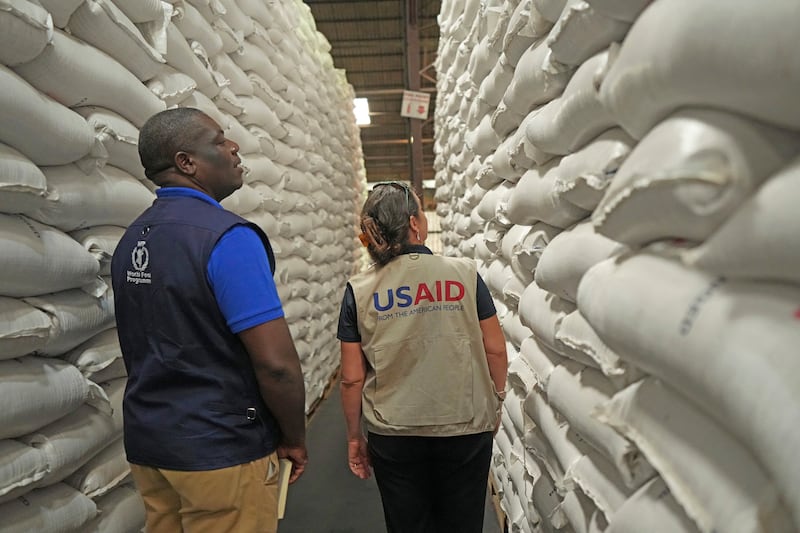When DOGE started slashing foreign aid with a chainsaw, Elon Musk claimed it was all about getting rid of waste, fraud and abuse. I’m pretty sure that no one disagrees that getting rid of actual waste, fraud and abuse is a good goal.
However, I also think it’s fair to say that sometimes, the worst perpetrators are the ones claiming to be watchdogs. Here’s a recent example: the destruction of 500 metric tons (over 1.1 million pounds) of food that could have fed 1.5 million children for a week, or 27,000 for a month. That food sat in warehouses for months because of the gutting of the U.S. Agency for International Development while aid workers begged to be allowed to distribute it.
The food, valued at $800,000, cost an additional $130,000 to burn, all paid for by taxpayer dollars. A million pounds of food and nearly a million dollars in taxpayer funds — poof. Up in smoke. What a waste.
Look, I get that $1 million is pocket change in Washington, but to most Americans, that’s a lot of money. Not only were the State Department’s actions wasteful, they were just plain wrong.
How did we get here?
On the first day of his second term, President Donald Trump issued an executive order suspending all foreign aid expenditures, except for those providing emergency and military assistance for 90 days. On March 10, the administration cancelled 83% of the programs run by USAID.
Food that had already been sent to places like Dubai and the United Arab Emirates was stuck in warehouses there, including over 1 million pounds of nutrient-rich biscuits meant for children who were severely malnourished and even starving.
According to Reuters, Jeremy Lewin and Kenneth Jackson, operatives of the budget-slashing Department of Government Efficiency, were appointed acting deputy USAID administrators and began terminating food security programs. USAID staff were barred from communicating with aid organizations that were asking to take the biscuits and distribute them to children in need.
Reuters also reported that a January 25 email sent by Jackson emphasized a “complete halt” to all foreign assistance and banned USAID staff from “any communications outside of the agency unless approved by their front office.”
“Failure to abide by this directive ... will result in disciplinary action,” said the memo reviewed by Reuters.
Aid organizations, including the World Food Program, asked the U.S. State Department for permission to distribute food for the people for whom it was intended, mostly children in Afghanistan and Pakistan, but these biscuits could also provide immediate nutrition for severely malnourished adults as well. The expiration date on two stockpiles of biscuits was this month and in September.
Secretary of State Marco Rubio told U.S. lawmakers on May 21 that no food would be wasted. An agreement to transfer the food to the World Food Program was approved on June 2, according to Reuters, and WFP was ready to receive all of the food. However, according to Hana Kiros, assistant editor for The Atlantic, an order to destroy the food had already been issued by the time Rubio told Congress that no food would be wasted.
The State Department’s reaction
In spite of approvals given in enough time to theoretically get the food into the hands of those who need it most, timely action was not taken. This weekend, the U.S. State Department confirmed that it had destroyed the 500 metric tons of food that could have been distributed.
State Department spokeswoman Tammy Bruce seemed to brush aside concerns about the unnecessary waste, telling reporters that “If something is expired, we will destroy it.”
She added that 500 metric tons represented less than 1% of the food aid typically distributed in a year and denied that the biscuits were allowed to expire “due to any mismanagement or inaction by USAID or the State Department,” according to a "Good Morning America" report. Another State Department spokesperson placed blame on the Biden administration, saying in essence they bought too much, and that the current administration was unable to “deplete (the food) before expiration.”
Still, that food could have been life-saving for many. Like the popular story of saving starfish on a beach, while no one could save all of them, this food would have made a difference “to that one.” Times more than a million.
Michael Rigas, the deputy secretary of state for management and resources, has been facing questioning from lawmakers.
Rigas initially told Virginia Sen. Tim Kaine and the rest of the Senate Foreign Relations Committee that it was government policy not to distribute the food as it neared the expiration date. Rigas was asked by Kaine why the State Department had not actually transferred the food as it had agreed,
“I don’t have an answer for that question, senator. I’m as distressed about that as you are,” Rigas responded. When pushed to respond further, he told Kaine he thought “it was a failure.”


